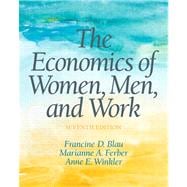The most current and comprehensive source available for research, data, and analysis on women, gender, and economics.
Blau, Ferber, and Winkler are widely known for their research and contributions on the study of the economics of gender. As active researchers and leading scholars on the subject, the authors are in tune with the most current and relevant research that’s included in Economics of Women, Men, and Work.









